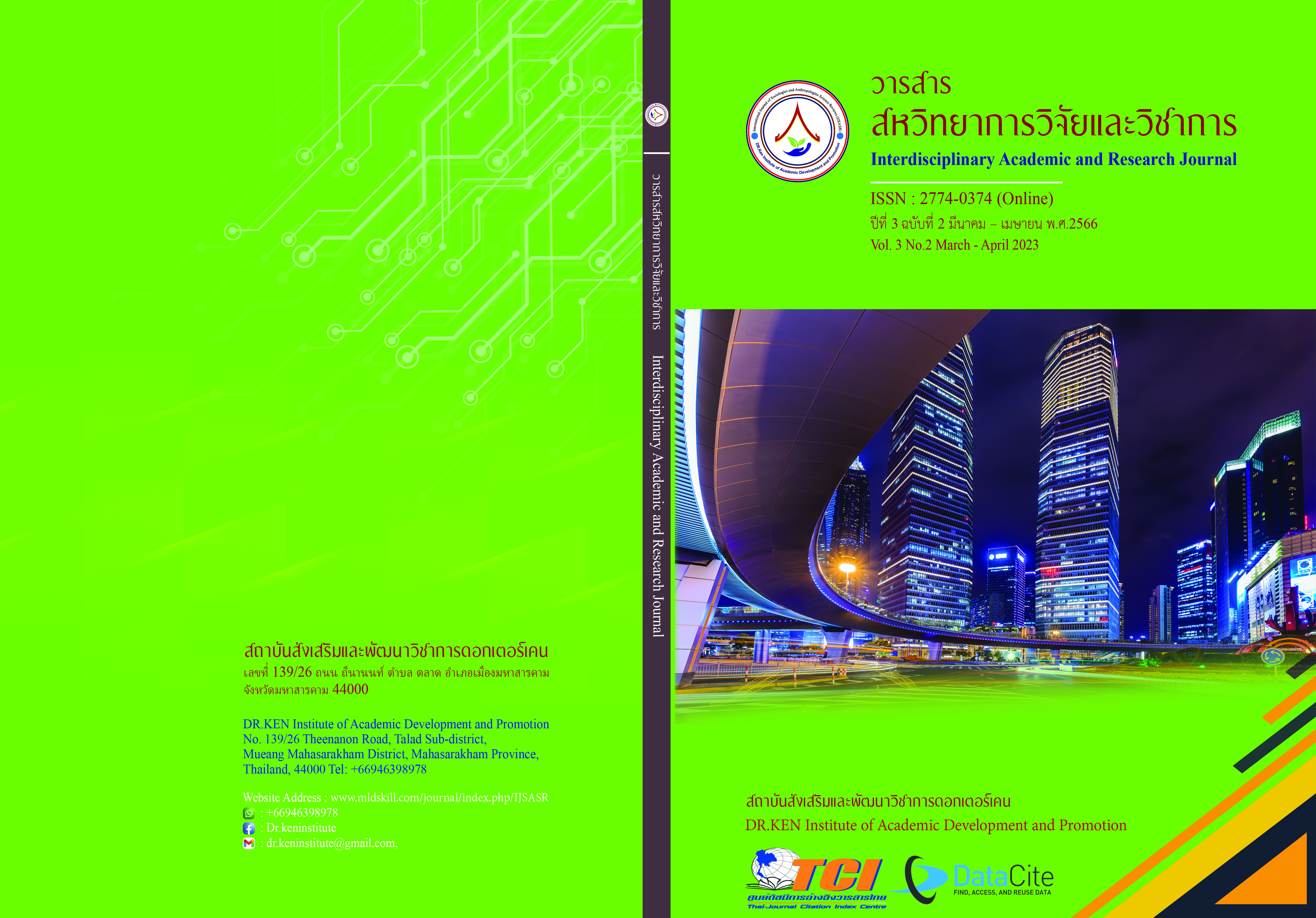A Model for Developing the Young People's Democratic Citizenship
DOI:
https://doi.org/10.14456/iarj.2023.97Keywords:
Citizen; , Citizenship; , Democracy; , Democratic Citizenship;, Democratic YouthAbstract
Citizens in a democracy, therefore, refer to members of a society that is independent, and self-reliant, exercising rights and liberties in conjunction with responsibility, respecting the rights and liberties of others, differences, equality, and social rules. Citizenship development and citizen culture building are considered national strategic agendas in which educational institutions have a role and duty to thoroughly enhance understanding, rights, freedoms, and political participation in a democratic system with youth. Therefore, this research article has an objective to create a body of knowledge to promote democratic citizenship. The target group used in the research were informants from government informants and seventeen informants from relevant officials who gathered data for the interview. The research tools were interview forms. To analyze data using qualitative data analysis. The results showed that the democratic youth citizenship promotion models include; (A)Promoting understanding, roles, responsibilities, and building awareness of good democratic citizenship. (B) Promoting social attitudes and democratic participation in political activities. (C) Promoting democratic political expression. However, the main factors that should be promoted overall are knowledge and understanding of the roles and responsibilities of democratic citizenship, social attitudes, and participation in democratic activities.
References
จารุวรรณ แก้วมะโน (2561). โครงการวิจัยเชิงปฏิบัติการเพื่อส่งเสริมชุมชนพลเมืองเข้มแข็งผ่านการเลือกตั้งสมานฉันท์และไม่ซื้อสิทธิขายเสียง. กรุงเทพฯ : สำนักส่งเสริมการเมืองภาคพลเมือง สถาบันพระปกเกล้า
ดรุณศักดิ์ ตติยะลาภะ, ภิศักดิ์ กัลยาณมิตร, เอก ศรีเชลียง (2560). การศึกษาสร้างตัวแบบสภาพลเมืองจังหวัดปทุมธานีสู่ความเข้มแข็งประชาธิปไตยไทย.วารสารวิจัยและพัฒนา วไลยอลงกรณ์ ในพระบรมราชูปถัมภ์. 12 (1), 231-245.
ถวิลวดี บุรีกุล (2563). ผู้หญิงไทยกับการเลือกตั้ง : โอกาสสู่ความเสมอภาค. กรุงเทพฯ : สำนักส่งเสริมการเมืองภาคพลเมือง สถาบันพระปกเกล้า.
ธนาชัย สุนทรอนันตชัย (2560). หน้าที่ของพลเมืองกับการเสริมสร้างสิทธิเสรีภาพสู่ความเป็นพลเมืองตามรัฐธรรมนูญแห่งราชอาณาจักรไทย พุทธศักราช 2560.กรุงเทพฯ : สำนักวิจัยและพัฒนา สถาบันพระปกเกล้า
ธัญธัช วิภัติภูมิประเทศ. (2556). ความเป็นพลเมืองในระบอบประชาธิปไตยของนักศึกษามหาวิทยาลัยธุรกิจบัณฑิตย์. กรุงเทพฯ: มหาวิทยาลัยธุรกิจบัณฑิตย์.
นพพล อัคฮาด (2560). วิถีประชาธิปไตยในบริบท วัฒนธรรมชุมชนอีสาน. วารสารการบริหารปกครอง. 6 (Special),84-104.
นริศ จันทวรรณ. (2560). ความเป็นพลเมืองในระบอบประชาธิปไตย: กรณีศึกษานักศึกษามหาวิทยาลัยรามคำแหง ระดับปริญญาตรี ส่วนกลาง. วารสารวิชาการ มหาวิทยาลัยพระนคร, 7 (1), 103-113.
บวรศักดิ์ อุวรรณโณ (2558). เจตนารมณ์ร่างรัฐธรรมนูญฉบับใหม่. กรุงเทพฯ : สำนักงานเลขาธิการสภาผู้แทนราษฎร.
ไพรัตน ฉิมหาด, บัญญัติ แพรกปาน และ สามิตร อ่อนคง (2563). การเมืองภาคพลเมืองกับการมีส่วนร่วมทางการเมืองในสังคมไทย. วารสารมหาจุฬานาครทรรศน์. 7 (5), 46-61.
รงค์ บุญสวยขวัญ (2557). ตัวชี้วัดการเมืองภาคพลเมืองในบริบทประชาธิปไตยไทย. กรุงเทพฯ : สำนักวิจัยและพัฒนา สถาบันพระปกเกล้า.
รัชตา คำเสมานันทน์. (2562). การมีส่วนร่วมในการส่งเสริมความเป็นพลเมืองของกรรมการศูนย์ส่งเสริมพัฒนาประชาธิปไตยตำบลในเขตภาคเหนือตอนบนของประเทศไทย. วารสารการเมือง การบริหาร และกฎหมาย คณะรัฐศาสตร์และนิติศาสตร์ มหาวิทยาลัยบูรพา, 11(2), 377-402.
เลิศพร อุดมพงษ์ (2562). การศึกษาเพื่อสร้างความเป็นพลเมือง (Civic/Citizenship Education) ในการส่งเสริมบทบาทของ ภาคพลเมืองในการเมืองระบบตัวแทน: แนวทางที่ยั่งยืนผ่านประสบการณ์จากต่างประเทศ. สถาบันพระปกเกล้า. Retrieved from https://www.kpi.ac.th/public/index.php/knowledge/research/data/257?page=16
วรากรณ์ สามโกเศศ. (2554). การศึกษาเพื่อสร้างความเป็นพลเมือง. มติชน ฉบับวันที่ 3 มีนาคม 2554 (กรอบบ่าย).
สัมพันธ์ รอดพึ่งครุฑ, ฐิติมา หิรัญรักษ์. และพัณนิดา อุปหนอง. (2564) จิตสำนึกความเป็นพลเมืองในระบอบประชาธิปไตย. วารสารวิชาการ มนุษยศาสตร์และสังคมศาสตร์ มหาวิทยาลัยราชภัฏอุตรดิตถ์, 8 (2), 154-165.
เอกภูมิ เจียมวิทยานุกูล, จรูญศรี มาดิลกโกวิท, และเลิศพร อุดมพงษ์. (2562). การศึกษาความเป็นพลเมืองในระบอบประชาธิปไตยของเยาวชนไทยตามกรอบสมรรถนะความเป็นพลเมืองในศตวรรษที่ 21. วารสารครุศาสตร์อุตสาหกรรม, 18 (1), 89-99.
Kenaphoom, S., Thitañāno (Tunin), D., Niyomves, B., & Pathumwan, K. (2020). Democratic Way of Life: The Thai’s Political Behavior. Solid State Technology, 63 (2s), 2167 - 2176.
Schulz, W., Ainley, J., Fraillon, J., Kerr, D. & Losito, B. (2010). Initial Findings from the IEA International Civic and Citizenship Education Study. Amsterdam: Multi Copy Nether lands.
Downloads
Published
How to Cite
Issue
Section
License
Copyright (c) 2023 ศศิธร อดิศรเมธากุล, วิจิตรา ศรีสอน, สัณฐาน ชยนนท์

This work is licensed under a Creative Commons Attribution-NonCommercial-NoDerivatives 4.0 International License.
Copyright on any article in the Interdisciplinary Academic and Research Journal is retained by the author(s) under the under the Creative Commons Attribution-NonCommercial-NoDerivatives 4.0 International License. Permission to use text, content, images, etc. of publication. Any user to read, download, copy, distribute, print, search, or link to the full texts of articles, crawl them for indexing, pass them as data to software, or use them for any other lawful purpose. But do not use it for commercial use or with the intent to benefit any business.
















.png)


